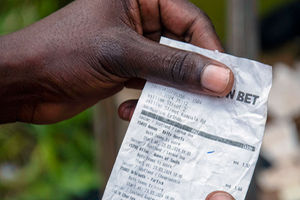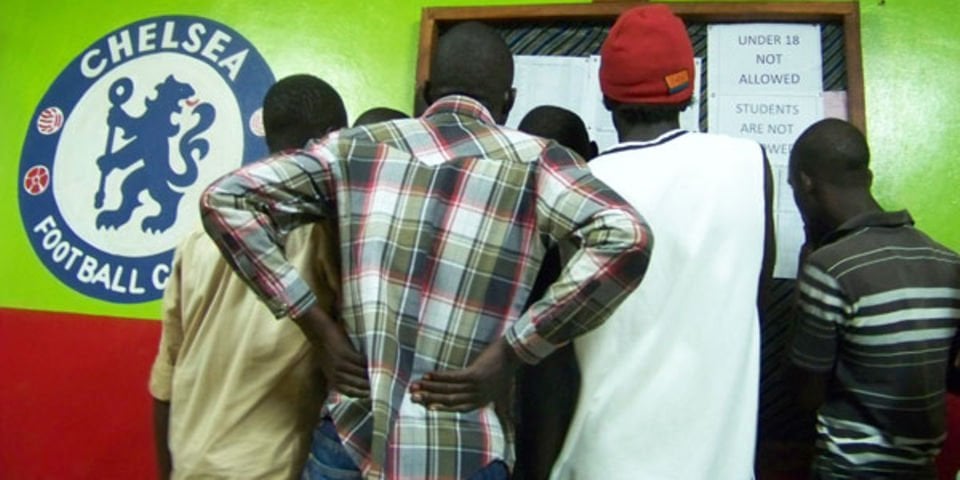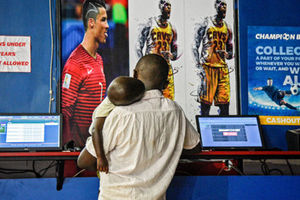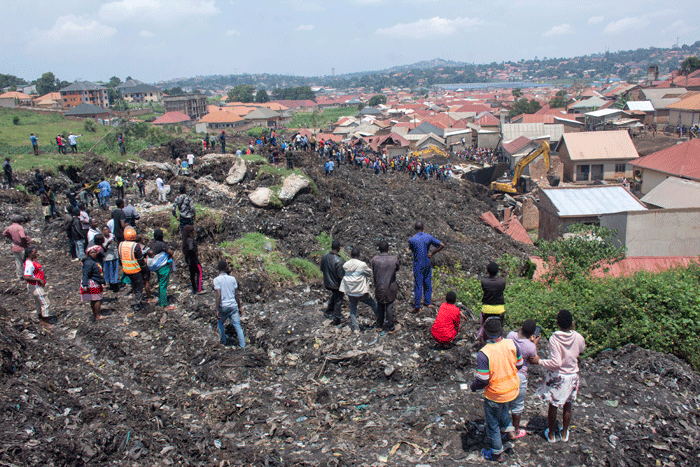
People play a game in a casino. The External Security Organisation (ESO) is investigating circumstances under which privately procured gambling machines, shipped under diplomatic cover between Russia and the Middle East, ended up being operated at Uganda’s Consulate building in Dubai, the United Arab Emirates. PHOTO | FILE
The External Security Organisation (ESO) is investigating circumstances under which privately procured gambling machines, shipped under diplomatic cover between Russia and the Middle East, ended up being operated at Uganda’s Consulate building in Dubai, the United Arab Emirates.
The foreign spy agency swung into action in April, this year, following concerns the practice breached provisions of the April 18, 1961 Vienna Convention on Diplomatic Relations that sets out the framework for the establishment, maintenance, and termination of diplomatic relations between states.
Article 41 of the convention provides that “the premises of the mission must not be used in any manner incompatible with the functions of the mission as laid down in the present Convention, or by other rules of general international law, or by any special agreements in force between the sending and the receiving State”.
Lottery is not a permitted undertaking under the Convention, and President Museveni reportedly ordered the machines to be removed after getting wind about it.
Our investigations show that the equipment was moved to UAE on October 29, 2023 aboard Ethiopian Airlines flight ET600 from Domodedovo Mikhail Lomonosov Airport in Moscow, the Russian capital.
Uganda’s embassy in Abu Dhabi, which oversees the Dubai Consulate, a couple of days later, on November 1, sought authorisation from the host government, through the Emirati Foreign Affairs ministry’s Department of Privileges and Immunities, to clear the cargo.
Upon grant of permission, the wrapped consignment was hauled for storage at the Consulate in Dubai where it was to be kept for no more than three months before eventual transfer to Uganda where it was reportedly for installation at a hotel of a minister.
It remains unclear why the buyer did not fly the personal property straight to Uganda or why Uganda’s Consulate in Dubai was particularly chosen for storage.
Highly placed sources told this newspaper that it is a common practice by top government officials, including ministers, to store personal valuables at diplomatic missions around the world, sometimes for several months, leaving diplomats conflicted on how to say no to their political supervisors without a risk to their jobs.
A Consulate is a smaller diplomatic post, usually offering consular services or promoting business relations, and complements an embassy, the highest level representation of one state in another.
The former is headed by a Consul, who may or may not be an ambassador, while the latter is led by an ambassador or high commissioner, often designated as a Head of Mission, and both represent the interests of the sending government and head of state in the receiving country.
After the gambling devices were moved to the Dubai Consulate, a senior minister in Kampala reportedly dispatched a pastor, who was a prayer warrior during the Opposition’s Black Monday demonstrations, as a special envoy and instructed diplomats there to grant the individual keys to access the Second Floor of the Consulate Building, where the machines were kept in pallets.
The reason? So, the machines could be disassembled, installed and tested if they would work well. These operations under the pastor’s watch are reported to have sporadically continued over six months --- double the time the machines were meant to be stored at the Dubai Consulate --- until President Museveni, who is Uganda’s chief diplomat, ordered their removal.
Senior Presidential Press Secretary, Mr Sandor Walusimbi, said he was not aware of the matter.
This newspaper understands that the ESO Director General, Mr Joseph Ocwet, flew to Dubai about a fortnight ago as part of his inquiries into a matter described by insiders as a potential diplomatic powder keg.
Mr Ocwet was unavailable over several days to speak on the matter. Inquiries into the alleged Casino scheme seized the attention of the technical wing at Uganda’s Foreign Affairs minister, with Permanent Secretary Vincent Bagiire flying to Dubai in May, while en route from Ankara, Turkiye, where he was to defuse in-fighting among senior embassy staff.
He later addressed the Ankara embassy staff retreat, to underline priority areas in the Uganda-Turkiye bilateral relations, held in the Mediterranean resort city of Antalya.
Sources close to the investigations said PS Bagiire, while in Dubai, toured the two-storied Consulate building, but found the room with the gambling machines locked, and attendant with the keys away.
It remains unclear what Mr Bagiire reported to his seniors on the fact-finding mission to the Consulate.
The PS did not respond to our inquiries to him on July 8.
Nonetheless, President Museveni directed Mr Zaake Kibedi, Uganda’s ambassador in Abu Dhabi who oversees the Dubai Consulate, to intervene.
Consequently, on May 12, Ambassador Kibedi, accompanied by the ESO attaché, flew to Dubai and, in the presence of Ambassador Henry Mayega, who heads the Consulate in Dubai, authorised the room to be forcibly opened for removal of the equipment.
Ambassador Kibedi did not pick up our calls nor respond to our message for comment on the matter.
The removed equipment, it turned out, was one that the Ugandan embassy in Abu Dhabi that he heads, on November 1, 2023 asked United Arab Emirates Foreign Affairs ministry, through its Department of Privileges and Immunities, to clear as diplomatic cargo.
“The embassy … has the honour to inform the latter (UAE) that cargo under airway mail No. 071-49449864 in the number of seven packages was transported on Ethiopian Airlines from Domodedovo International Airport (in Russia) en route to Dubai International Airport and arrived [in Abu Dhabi] on October 29, 2023. In this regard, the embassy wishes to request the esteemed ministry for clearance of the cargo,” reads the diplomatic note under reference ADM/230/39/2023-25.
According to the air waybill, the consignment included “used furniture parts”. Our investigations show that Uganda’s Ambassador to Russia, Mr Moses Kizige, designated a one Kurshev Roman Igorevich as holding power of attorney to pay for and ship the items.
In an undated letter referenced XM/AD/01, and addressed to the Domodedovo Customs, Ambassador Kizige noted that Uganda’s embassy in Moscow that he superintends, “… empowers Kurshev Roman Igorevich … to carry out customs clearance, receive the goods from the warehouse/hand over the goods to the warehouse and sign for the receipt/delivery of the goods, pay all fees and duties as well as perform all procedures [and] actions related to the shipment of the diplomatic cargo”.
We were unable to establish why the envoy committed the state of Uganda to a shipment of a consignment said to be personal property and where a private individual picked associated bills.
Ambassador Kizige referred our inquiries to Gen Jeje Odongo, the Foreign Affairs minister, without indicating why.
“From time to time we receive requests to clear cargo. But on this matter, please, call Gen Odongo,” Ambassador Kizige told this newspaper from Moscow.
Similarly, Ambassador Mayega, who heads the Dubai Consulate where the cargo ended, according to the official account for storage on instructions of supervisors, referred this newspaper to Gen Odongo.
“Please, call Hon Gen Jeje Odongo for details about this matter,” Ambassador Mayega said by telephone.
In Kampala, and upon learning that this newspaper was investigating the story, the Foreign Affairs minister was the first to reach out to us, at 3:15pm on Thursday, offering to tell his side of the story.
However, he did not when we got back to him, saying he was down with high blood pressure.
A day later, on Friday, when this newspaper contacted the minister for the second time, he texted back: “I believe you need something detailed and that can only be possible through face-to-face interaction.”
Gen Odongo offered no appointment and had said nothing more by press time, leaving us unable to corroborate with him if he owned the consignment linked to him.
It was also not immediately clear if he had prior knowledge that the equipment had been mounted and operated by two Ugandan nationals – assigned as special envoys - with diplomatic credentials issued by Foreign Affairs headquarters in Kampala.
Spymasters reportedly took them in for questioning as part of the broader inquiries.
Sources said the emissaries had access to the Consulate building, which under diplomatic protocol is considered sovereign premises of Uganda, and would enter and exit freely, including hosting alleged punters during evening hours.
Officials in Kampala feared this practice is likely to prompt the host government, in this case of the United Arab Emirates, to investigate what exactly happened at the post, the outcome of which could impact Uganda-UAE bilateral relations.
Article 42 of the Vienna Convention provides that “a diplomatic agent shall not practice for personal profit any professional or commercial activity in the receiving state”.
However, there have been numerous incidents of Ugandan diplomats bending diplomatic protocol. A senior diplomat was in 2019 busted in the Sudanese capital of Khartoum, allegedly importing a container of liquor in a predominantly Muslim country. The matter, sources indicated, was raised with President Museveni who later fired the diplomat.
On Friday, a senior Ministry of Foreign Affairs official telephoned this newspaper to say it was their official position not to comment about the unfolding events in Dubai, which the diplomat baptised as “misinformation”.
Multiple accounts and documents we have reviewed show that the consignment was exported from Russia which President Museveni, accompanied by top Ugandan diplomats, visited for the July 2023 Second Russia-Africa Summit held in the port city of Saint Petersburg.
There appeared to have been a misunderstanding about the details of the items, which attracted the attention of Russian officials, prompting Uganda’s embassy in Moscow in October 2023 to plead with Moscow for its export to the Middle East.
In an inventory document titled, invoice-cum-packing list, the package was said to contain a big dining table, a small dining table, legs for tables, bar chairs and souvenirs and decorate wheels. The items cost $6,350 (Shs23m) and weighed slightly over a tonne.
We were unable to find a record showing Uganda’s Foreign Affairs ministry, directly or through any of the embassies, procured the purported furniture.
In an October 18, 2023 letter to the head of Customs at Moscow Domodedovo Mikhail Lomonosov Airport, Ambassador Kizige sought the release (unclear from where) and safe passage of the items.
“The above-mentioned goods are not for industrial or commercial purposes, they were used exclusively for official needs by the embassy in order to perform functions under the Vienna Convention on Diplomatic Relations,” he noted.
Ambassador Kizige added: “The Embassy of the Republic of Uganda asks for permission to release this cargo and guarantees that the exported goods are not prohibited for export from the customs territory of the Customs Union, military goods, dual-use; do not contain elements of extremism and pornography that are under the protection of flora and fauna or parts thereof; do not require permits for the export of authorised state of bodies of the Russian Federation; are not subject to state registration.”
It remains unclear why ambassadors Kizige and Kibeedi processed the consignment for final delivery to the Ambassador Mayega-led Consulate in Dubai, which not long ago was flagged for possible closure over apparent budgetary constraints.
The UAE allowed Uganda in April 2022 to open the Consulate, a key financial and commercial hub. Its purpose is cut out: promote trade relations and facilitate diplomatic services for Ugandans in the UAE northern territories of Sharjah, Fujairah, Ajman, Umm Al Quwain, and Ras Al-Khaimah.
Its achievements under Ambassador Mayega have included scouting investors some of whom met President Museveni in Uganda and have set up real estate and financial businesses in Kampala.
The consulate started as a Liaison Office for the Dubai 2020 Expo, which was held in 2021 and attended by Mr Museveni.
The Ugandan leader last November flew out to Abu Dhabi - where the Ugandan embassy for a bilateral relationship started only in 2009 is located - at the invitation of His Highness Sheikh Mohamed bin Zayed Al Nahyan.
Key Emirati investments in Uganda include the $200m (Shs800b) ROWARD Capital Commercial Broker LLC - Uganda Telecommunications Corporation Limited (UTCL) merger which is being thrashed out.
In January, the Ministry of Energy tapped a consortium led by Alpha MBM Investments LLC under His Highness Sheikh Mohammed bin Maktoum bin Juma Al Maktoum, a member of the Dubai Royal Family, to finance and construct the longshot 60,000 barrels per day (bpd) oil refinery in Buseruka sub-county in Hoima District.
A previous run-in between the two countries was when the Emirati kicked out Ambassador Nimisha Madhvani from Abu Dhabi after she facilitated a group of Ugandan lawmakers looking into reports of enslavement and mistreatment of Ugandan migrant workers. Ambassador Madhvani, now heading Uganda’s High Commission to Londo, was at the time deployed to Copenhagen, Denmark, in a cross-transfer with Ambassador Kibedi.
Earlier in 2010, authorities in London bust a Ugandan diplomat for using tax or duty-free privilege cards to buy and hoard alcohol which he resold to restaurants. Restaurant owners would sometimes flock to Uganda’s High Commission in London to pick up their merchandise which sparked interest by British diplomatic police.
Under the Geneva Convention: “A diplomatic agent shall be exempt from all dues and taxes, personal or real, national, regional or municipal” except in cases of indirect taxes of a kind which are normally incorporated in the price of goods or services, estate or inheritance levy, and dues and taxes on private immovable property situated in the territory of the receiving state.
In a separate interview, State Minister for Foreign Affairs Okello Oryem said, if true, conducting a lottery inside diplomatic premises is “criminal”.
“I’m hearing about this for the first time from you, but if our diplomatic staff engaged in such activity then it is absurd and criminal. An embassy building and Consulate enjoy a diplomatic privilege; so, to turn them into a Casino is not only in contravention of the Vienna Convention on Diplomatic Relations but also a breach of trust,” Mr Oryem told this newspaper by telephone.
He added: “What I know [is that] there were fights over resources at the Consulate and the PS went there to address the situation. I will particularly ask my technical staff about this particular case.”







